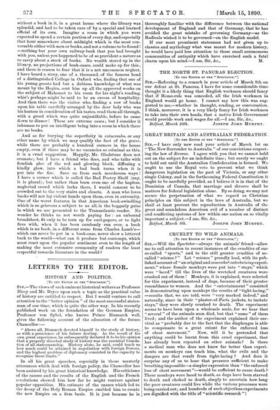LETTERS TO THE EDITOR.
HISTORY AND POLITICS.
[To THE EDITOR OF THE "SPECTATOR."] SIR,—The views of such eminent historical writers as Professor• Dicey and Mr. Bryce upon such a topic as the practical value of history are entitled to respect. But I would venture to call attention to the " better opinion " of the most successful states-
man of our time, which is quite the other way. In his recently .published work on the foundation of the German Empire,
Professor von Sybel, who knows Prince Bismarck well, gives the following account of the education of the future Chancellor:— "Above all, Bismarck devoted himself to the study of history, as with a prescience of his future destiny. As the result of his own great experience, he subsequently declared it to be his opinion that a properly directed study of history was the essential founda- tion of all statesmanship. History alone, he said, could teach us how much could be attained in negotiation with foreign Powers, and the highest problem of diplomacy consisted in the capacity to recognise these limits."
In all his great speeches, especially in those masterly utterances which deal with foreign policy, the Chancellor has been assisted by his great historical knowledge. His criticisms of the causes and the results of the English and the French revolutions showed him how far he might venture against popular opposition. His estimate of the causes which led to the decay of the Holy Roman Empire enabled him to create
the new Empire on a firm basis. It is just because he is
thoroughly familiar with the difference between the national development of England and that of Germany, that he has avoided the great mistake of governing Germany—as the- Radicals wished it to be governed—on the English model.
If our most prominent statesman had not given up to• classics and mythology what was meant for modern history,. he would have paid less attention to those small autonomous communities of antiquity which have exercised such a fatal• charm upon his mind.—I am, Sir, &c., M.






































 Previous page
Previous page